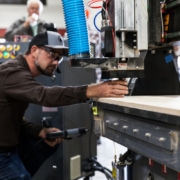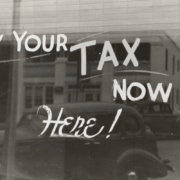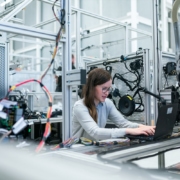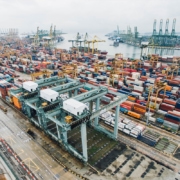Maketory Grows New Manufacturing Companies in San Diego
It’s exciting to have a new Maker Space in Southern California. Maketory is an industrial coworking facility that provides flexible fabrication and manufacturing in a 26,000 sq. ft. building in the Miramar/Mira Mesa area of San Diego, California. Since opening in December 2019, Maketory has become a hub of creativity and innovation for inventors, innovators, and entrepreneurs as the only Maker Space south of Carlsbad in North San Diego County.
I visited Maketory on February 11th and was given a tour by Manager Shaun Kain. He said that they offer private office suites, private work studios, on-site storage for materials and supplies, free Wi-Fi, and free parking. The facility’s ground floor contains a wood shop, metal shop, welding area, prototype/assembly area, 34 private work studios, and a blacksmith shop outside the back of the building. The second floor has a small and large conference room, an open space for meetings or training sessions, and private offices.
The wood shop contains the following equipment: a 4’ X 8’ 3-axis router, bandsaw, table, scroll, panel, and chop saws, lathes, drill presses, wide belt sander, disc, spindle, and edge sanders, a 20” planer and 12” jointer.
The metal shop has a 10’ X 6’ Flow waterjet, MIG and TIG welders, belt and disk grinders, manual lathe, manual and CNC mill, plate roller, shear, and tube bender, cold saw, band saw, and drill press.
The prototyping/ assembly area contains 150- and 80-watt lasers, 3D printers, and workbenches. The blacksmith shop contains 110- and 135-ton pneumatic hammers, a 50-ton screw press, and forges, anvils and hammers.
I also spoke with Carlos Shteremberg, one of the founders of Maketory. When I asked for background information to help me understand why he established Maketory, he said,
“I was born in Mexico City and moved to San Diego in 1998 and got a degree from USD in business and accounting. I worked in manufacturing and became president of Pico Digital, a communication company that provided digital TV to hotels and apartments. We were a partner with Dish Network and had a significant market share. The majority of our manufacturing was in San Diego, as well in Taiwan, Canada, and Mexico. The company was purchased in 2016 by HIG Capital, a private equity firm, but I continued as president for a while. Then, I looked for something to do next, and we created Maketory, a facility that would be a place for coworking and small-scale manufacturing while serving as a tech and industrial incubator for the San Diego community.”
He explained,
“I learned that opening a new business is always more difficult than you expect and takes more money than you expect. So, you have to endure some rough times, and some entrepreneurs give up. It’s also hard to transition from working in an established business to starting a new business. We wanted to create an environment where businesses and individuals can quickly achieve success with minimal investment. Not everyone is a software developer that can work out of a home office or a traditional coworking space. There are a lot of individuals, small businesses, and entrepreneurs that have to do physical things, so they need a physical operating space that isn’t cost-prohibitive. Also, people don’t want to be alone so a Maker Space creates a social atmosphere.”
In response to my question about funding to start Maketory, he said,
“We are totally self-funded as a for-profit corporation when most Maker Spaces have a non-profit sponsor. Our lowest membership is $249/month for using all of the shop space. Private work studios and offices start at $300/month. We require a commitment of one year for a membership agreement because we want to develop a commitment of respect for our facility and equipment. We have a professional staff of managers and instructors for the classes we provide. At Maketory, you to go as fast as you want. We have some of our members that have been able to make products in only a few weeks.”
He added, “Larger existing companies can benefit from using the facilities of Maker Space to develop prototypes for new products because there are many companies that subcontract out manufacturing services and don’t have the in-house equipment to make a prototype.”
I asked if they offered classes on how to use the equipment, and he said, “Yes, our Maketory Academy provides classes for operating every machine, as well as how to design, Lean manufacturing, and robotics. Depending on the topic, members have to pay separately for the classes they need, ranging from $120 – $350, depending on the topic. We partner with LSSI and CMTC to help some members get help subsidizing the classes. Our Maketory Academy is an aspect of our business that we see expanding into the future to service the San Diego community, including students, colleges, high schools, veterans, and active military. And local entrepreneurs. The Lean training is provided by LSSI, headed up by Luis Socconini.” I told him that I got my Lean certification from LSSI in 2014.
I asked how they were affected by the COVID pandemic that put another Maker Space, Vocademy, out of business in Riverside. He said, “We had only been open three months, so it hurt to have to close for a few weeks. But it gave us time to put the safety protocols the state required before opening back up in May. We now have about 160 members. Most of our members stuck with us during the shutdown unless they had to move out of town for personal reasons or jobs.”
I told him that I’ve been a board member for the San Diego Inventors Forum and give an annual presentation on selecting the right processes and sources for your new product. I offered to give the presentation in person for his members or record a video that his members could watch. He said that sounds like a good idea.
In conclusion, Maker Spaces is a good idea for any community that wants to accelerate the development of manufacturing businesses in their region. After visiting Maker Spaces in several states, Maketory is one of the very few that an entrepreneur has started as a for-profit business. Most Make Spaces have had an economic development agency, chamber of commerce, or community college as their sponsor. Let’s hope that more successful entrepreneurs will follow the example of Carlos Shteremberg in the future.










Leave a Reply
Want to join the discussion?Feel free to contribute!